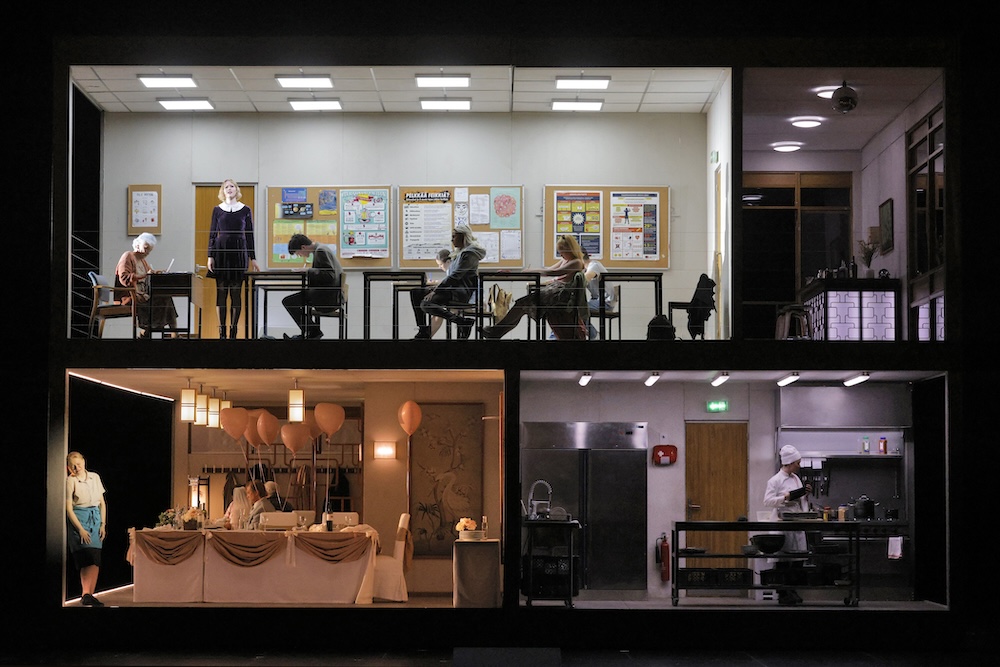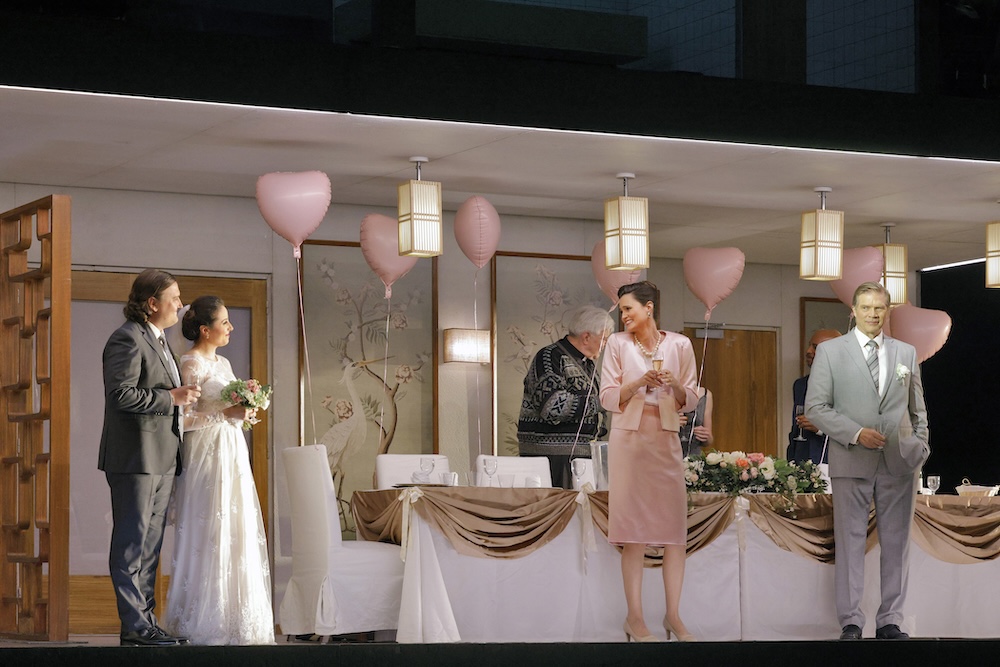Rarely has an opera performance enthralled audiences as has Kaija Saariaho’s Innocence just now at San Francisco’s War Memorial Opera House.
We were entranced for its 105 minute duration, suffering the enduring traumas of a school massacre, recognizing our collective guilt, confessing our participation, and finding, finally, a certain redemption in our loss of innocence. [Lead photo is Rod Gilfry as the father, Ruxandra Donose as the waitress.]
Innocence is the last of Kaija Saariano’s six operas, completed two years before her death in July, 2023. The libretto was constructed in Finnish by Sofi Oksanen, a Finnish/Estonian novelist, and then made into this multilingual version by Saariaho’s son, D’Alesksi Barrière. Innocence premiered at France’s Aix Festival in 2021, a co-commission by San Francisco Opera with Helsinki (staged in 2022), Amsterdam and Covent Garden (staged in 2023), and the Metropolitan Opera (to be staged in 2025).
The commissioned production is by Australian stage director Simon Stone, well known on progressive European stages. Mr. Stone works in a kind of photo-journalism that establishes an immediacy and an urgency of musical/operatic reportage. He staged Innocence in a two story, open sided, modern building that is transformed as it slowly turns from a banquet room below the dining room of a restaurant complete with kitchen and bathrooms into a school with classrooms, restrooms, a broom closet, and a cafeteria. The continuing transformations of the structure’s Interiors and exteriors are somehow wrought by a huge team of backstage set dressers.

The storytelling is indeed complex, intermingling the traumatic, post massacre lives of the students and a teacher at an international school (one assumes in Finland) who had survived a massacre at the school ten years previously. The shooter, also a student, is soon to be set free (legally protected as a minor at the time of the crime). The shooter was and is loved by his mother, he had been given a gun by his father, he was worshipped by his younger brother. The shooter was aided by an abused friend and counseled by a priest.
Now, ten years later, at the opera’s inception the brother of the shooter is celebrating his wedding, his bride, an orphan, is a refugee from the Eastern bloc. By happenstance the waitress for the wedding banquet is the mother of one of the shooter’s victims. She, Tereza, is the catalyst for the disastrous wedding, and the destruction, emancipation, salvation and even some redemption for the myriad lives in which we immersed ourselves for the duration of the opera.
The Simon Stone production fit quite successfully onto the War Memorial stage. The casting was changed in important ways from the opera’s premiere in Aix. Most prominently in San Francisco was the role of the waitress Tereza, here performed by Bulgarian mezzo-soprano Ruxandra Donose. Mme. Donose possesses a great warmth of voice, as well she projected a humbled, beaten but proud persona, and a mother obsessively grieving for her murdered daughter — who was, and still is, the center of her life. This was the role that held the pivotal humanity of Innocence.

Another crucial cast change in San Francisco was Los Angeles bass baritone Rod Gilfry as the father, Hynrik, of the groom and the shooter. Mr. Gilfry has an unmistakable presence that exudes both strength and vulnerability, authority and insecurity. At age 65 he is in beautiful voice, and brought an important, vivid presence to the role of the terrified father. Canadian soprano Claire de Sèvigné was the mother of the shooter, Patricia, who sang in urgent, even strident tone her need to love her murderer son.
A further significant cast change was the role of the groom, Tuomas, in San Francisco taken by Michigan tenor Miles Mykkanen. Of beautiful, clear voice and vibrant presence he was the exuberant lover at his wedding, the insecure son arguing with his father, and finally the conflicted accomplice to the shooter who cowardly fled the scene of the shooting. In the end he was ruined, but freed from the innocence he had feigned.
Less successful was the casting of veteran San Francisco Opera bass Kristinn Sigmundsson as the priest. Insecure vocally he seemed lost on the stage, never actualizing the persona of a priest, much less the pious simplicity of a flawed country priest.
There were the splendid carry-overs from the original cast in Aix. Markéta, the ghost daughter of the waitress, was sung by Finnish soprano Vilma Jää in electronically modified, spectral tones. Dressed in black with platinum hair, and of towering figure, she, like her mother, was a pivotal voice in the humanity of Innocence with her mocking songs. The orphan bride Stela of the Aix cast was sung by Dutch soprano Lilian Farahani who projected a simplicity of voice and spirit, wanting only to escape her past, to find someone to love, and to find family. The teacher in the International School, from Aix as well, was skillfully enacted with a powerful presence by American soprano Lucy Shelton. She executed both guttural and sung tones in her two wrenching monologues.
In addition to Markéta there are five more international students with sung or sprechstimme roles in various languages. Among them was Student No. 3, known as Iris. Like Markéta, she was a pivotal voice in the humanity of the opera, and just like Markéta she was of towering stature with a platinum wig. Played by French actress Julie Hega, she spoke in very present, rich, warm French, carefully plotting with the shooter the murders of the students she hated. Angrily she detailed how she had been excluded from the triumph of the massacre, condemning the cowardice of the groom.
The relationships among the huge cast of singers and actors were exhaustively exposed, examined and portrayed in careful detail in this Simon Stone docudrama. It was re-created both in Amsterdam and San Francisco by British stage director Louise Bakker.
Where was composer Kaija Saariaho in all this, you may surely ask. French conductor Clément Mao-Takacs began the evening with an all too brief orchestral introduction where we could appreciate the magic of Mme. Saariaho’s score — splendid timbre based sounds in the French tradition, like Debussy, Ravel and Messiaen through a Boulez filter. Saariaho’s music is however very much its own voice, with sounds relating not on tonal relationships or serial order but in frequency synchronicity.
Mme. Saariaho must have known that her music could only float underneath and reinforce the horror of this contemporary story, so vividly exposed by stage director Simon Stone in his docudrama. Whereas the immediacy of Aix’s Grand Théâtre de Province gave much more presence to this magnificent orchestral score, the stage was far less involving than in San Francisco, and with far less sympathetic actors.
This problematic opera awaits a staging that balances the intensity of the story with the vibrancy of the score.
Michael Milenski
War Memorial Opera House, San Francisco, California. June 7, 2024. All photos copyright Cory Weaver, courtesy of San Francisco Opera